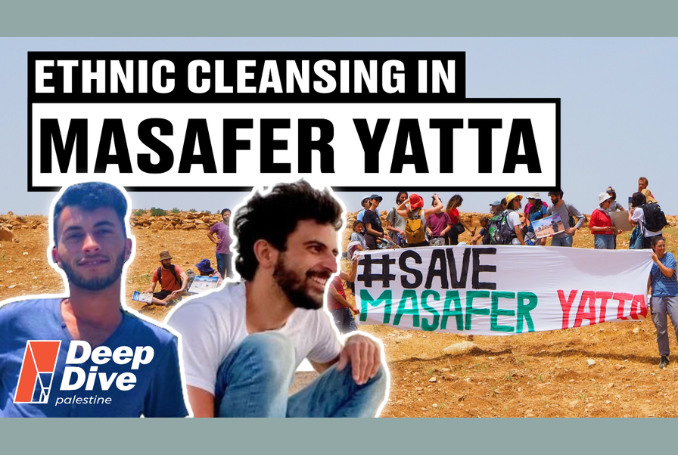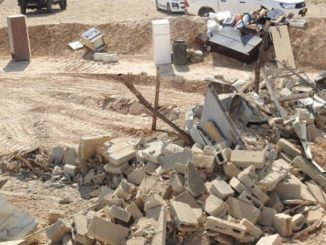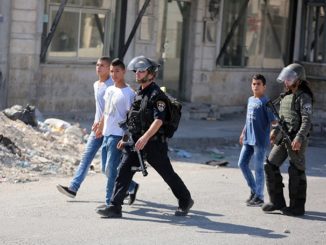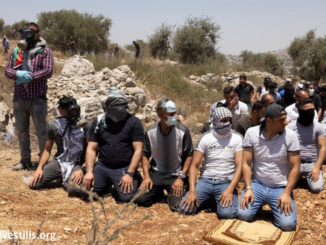
In its latest live show, Palestine Deep Dive shines a spotlight on Israel’s ongoing forced displacement of Palestinians in Masafer Yatta, a region in the South Hebron hills of the occupied West Bank, Palestine.
The show titled, ‘My Home is Not a Military Firing Zone: On the Ground in Masafer Yatta’ sees show host, Mark Seddon, who served as a speechwriter for former Secretary General of the United Nations Ban Ki-moon, in conversation with the journalists Basil Al-Adraa and Yuval Abraham.
Adraa is a Palestinian journalist, activist and local resident of Masafer Yatta and Abraham is Jewish-Israeli journalist and activist, writing for +972 Magazine.
Seddon begins by playing two videos shot by Adraa recently in Masafer Yatta, the first taken on 22nd June shows Israeli soldiers aggressively pushing and dragging Palestinians while telling them to leave the area. Adraa comments:
“This happened last week, last Wednesday, when the army came to do a military exercise in the Masafer Yatta area. This is the first military exercise after the court decision… on the 4th of May, that gave the green light for the Israeli army to evacuate people and to do their military exercises within our communities.”
On May 4, Israel’s Supreme Court rejected a petition against the eviction of more than 1,000 Palestinian inhabitants from the area, saying in its ruling that it found the Palestinian residents there had not been permanent residents of the area when the Israeli military first declared it a firing zone in the 1980s.
Military Exercises Begin in Masafer Yatta
“The army announced that [the drills] are going to happen for one month,” Adraa says.
“During this military exercise, they’re bombing, and today they were shooting. They come with tanks in the fields, in the villages and next to the houses… No one is allowed from the Palestinians to move around the village… today for example, a student has [missed] his secondary school exam. He was prevented [from attending] his school.”
Masafer Yatta residents and Israeli rights groups say that most of the Palestinian families have been permanently living in the 3,000-hectare area well before Israel captured the West Bank in the 1967 War. Their eviction would be a violation of international law.
‘The decision, weaving baseless legal interpretation with decontextualized facts, makes it clear that there is no crime which the high court justices will not find a way to legitimize,” say B’Tselem.
Describing the circumstances surrounding the second clip Seddon plays in the show, which shows Israeli soldiers breaking into Adraa’s home on 23rd May, Adraa says:
“Since February until today at least seven times, the soldiers have raided my family home. Two times in these raids my father was detained. I was beaten and attacked brutally while I was filming.”
Adraa says that Israeli activists have also been beaten and had cameras confiscated in what he describes as “collective punishment” for their activism. Since December, he says the Israeli soldiers have confiscated five of his cameras and one laptop during raids on his family home.
Adraa describes how Palestinians in his neighborhood have been suffering since the 1980s, when they “felt the presence of the Israeli occupation in the area” through the building of illegal settlements and construction of water, electricity and road infrastructure solely for the settlers.
As early as 1999, Adraa recalls Palestinians being forcibly displaced from the area:
“The army brought in trucks, picking up everyone… taking them off the map… for six months people were trying to go back to work their land… a lot of them got caught and stopped by soldiers and they were sent to jail.”
Abraham considers the wider context, illuminating Israel’s apartheid policies which fragment Palestinian communities in the occupied West Bank, leaving the residents in Mustafa Yatta particularly vulnerable and exposed:
“Area C is under complete Israeli military control, meaning the Israeli military is also the one responsible for civil things. For example, a Palestinian village living in Area C, if the residents want to get a building permit, to get a permit to construct a road, to connect to water, everything has to go directly through the Israeli military.”
Area C accounts for over 60% of Palestinian land in the West Bank where over 5,000 military laws and edicts dominate the lives of Palestinians there. In the last five years, Israel has approved less 0.4% of Palestinian requests for building permits. Abraham continues:
“We have Masafer Yatta and almost 200 Palestinian villages who are in the C area, and it’s impossible for them to live. They can’t build anything. Anything they build is being destroyed, and it’s really a brutal policy that is fulfilling this vision of the Israeli government to concentrate Palestinians into enclaves. It’s a form of ethnic cleansing. They want to cause the Palestinians to be stuffed inside the Palestinian cities, while Israel controls all of the space around. This is what’s happening now in Masafer Yatta, and in a way, it’s what’s happening all across our region, from the river to the sea. It’s happening in Jerusalem and in the Negev.”
The Role of Settlers and Settlements
Investigating the involvement and role of settlers in the forced displacement of Palestinians in Masafer Yatta, Abraham says:
“Mark, it’s funny you ask this question now because just yesterday, I uncovered this document in the archives of protocol of Ariel Sharon who was an Israeli politician, he was the Prime Minister and the Israeli Minister of Defence. He’s the one who was involved in creating these firing zones in the West Bank. In this protocol, he actually says, this is a direct quote now from him, he says, ‘I declared these firings zones in order for there to be reserved territory for the Israeli settlements.’”
Indeed, Haaretz reported in 2020 of the discovery of minutes from a July 1981 meeting of the Ministerial Committee for Settlement Affairs with Ariel Sharon, who was the minister of agriculture at the time, advocating for “expanding and enlarging the shooting zones” in order ”to keep these areas, which are so vital, in our hands”.
“It’s very, very clear that it’s a political tool by Israel, but even Sharon was saying it. Almost 20% of the West Bank is a firing zone. It’s clearly, I think for me, not even a debatable question. It’s really a historical fact that this is not some military need. It’s clearly a political tool to take over Palestinian land in the West Bank, and the Zionist leaders who are talking about it, they know,” asserts Abraham.
He continues to illuminate the role and impact of settler violence on Israel’s colonial ambitions in the West Bank:
“From what I see, settler violence today is one of the main mechanisms that is actually supporting what the army is doing in Masafer Yatta. On the one hand, you have the bulldozers who are destroying the homes and soldiers and the Supreme courts that’s ruling to evict the people. On the other hand, you have settlers from the nearby outposts and settlements who are actually coming down to these villages and attacking residents.”
Taking a closer look at the behavior of settlers in Masafer Yatta, Abraham recalls his experiences:
“Me and Basil were together in November when settlements came in mass numbers, more than almost 100 settlers for one of these villages, with clubs. They were masked with clubs and bats, and they started bashing all the cars and the homes, throwing rocks inside the windows. They broke the head of a three old child, got his skull fractured, and you see these different forms of violence that are supporting each other. One violence is legal violence. It’s like the military law doing the violence, and the other violence is illegal, but it’s happening with the support of the law, so it’s this mechanism that’s working together.”
Seddon asks Adraa whether any of the settlers have been prosecuted and what his thoughts are on the Israeli politicians who seem to condemn some settler violence in posts on social media:
“It’s only happening on Twitter and in the media outlets, but on the ground, settler violence is growing and growing.”
“Settler violence is a policy of the State of Israel… they’re stealing our land, expanding the net, getting all the infrastructure [from] the State of Israel. While we, who own the land, who own the evidence to prove that we own this land, are prevented to have infrastructure, prevented to build homes or schools or clinics or good road on our land, but the settlers who own nothing, the states provide them everything in order to come and to live in this area.”
Superficial International Condemnation – Words Not Actions
Seddon asks whether recent statements of condemnation from the EU, UN and UK have any impact on Israeli policies on the ground:
“No, there is no impact of these condemnations that we hear every once in a while,” Abraham responds.
“On the contrary, I think on the ground, the situation is getting worse for Palestinians, and the occupation is becoming more and more enshrined as part of the Israeli system. I think that what needs to be done is actual actions. We see the way the west has responded, for example, for the Russian occupation in Ukraine, and we know that there are, for me as someone who lives here, who has Israeli citizenship, I believe that the West definitely needs to take concrete action in the form of the numerous things that the BDS movement is suggesting and to really make Israelis also feel that they’re paying a price for this.”
Agreeing with Abraham, and calling for action, not just words, Adraa says:
“For us, we’re really hurt by the hypocrisy of the international community that keeps… almost saying everything, keeps condemning, sending out statements and comimg to take videos. This [British] minister come today and took a video, but now the army keeps doing the training and bombing. The facts on the ground are just created by the Israeli settlers and Israeli occupation soldiers [which] hold the power to do whatever they want.
“I believe that if this international community is interested in a solution to our facts as Palestinians, they are the only ones who can do it through their sanctions on the Israeli authorities, so they can stop what they’re doing,” says Adraa, before calling on the global public to make more noise:
“I would love to see people keep pushing their governments to make Israel hand sanctions, to see solidarity. People protesting, keep writing and posting about Masafer Yatta, share our story. It’s very important.”
Closing the show, Abraham gives a strong message condemning false allegations of antisemitism launched against those demanding justice for Palestinians:
“I want to say maybe as someone who is Jewish, that there is a lot of smears happening of criticism against the Israeli apartheid being labeled as antisemitism, or in some way being against Jews or against Israelis. I think this is wrong. Really, listen to your conscious, listen to your heart. This is apartheid going on on the ground. It’s very, very clear, and it’s time to really take concrete action against it because we are really going down, down, down, it’s deteriorating, and it’s very scary.”
(Palestine Deep Dive)







